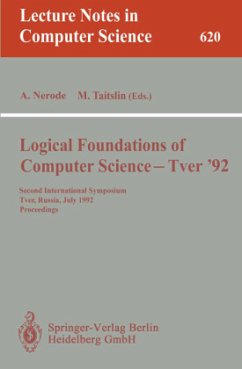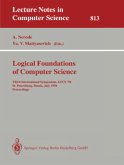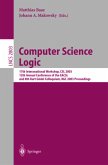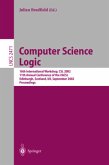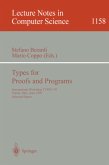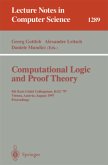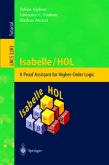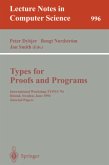Anil Nerode / Mikhail Taitslin (eds.)Second International Symposium, Tver, Russia, July 20-24, 1992. Proceedings
Logical Foundations of Computer Science - Tver '92
Second International Symposium, Tver, Russia, July 20-24, 1992. Proceedings
Mitarbeit:Nerode, Anil; Taitslin, Mikhail
Anil Nerode / Mikhail Taitslin (eds.)Second International Symposium, Tver, Russia, July 20-24, 1992. Proceedings
Logical Foundations of Computer Science - Tver '92
Second International Symposium, Tver, Russia, July 20-24, 1992. Proceedings
Mitarbeit:Nerode, Anil; Taitslin, Mikhail
- Broschiertes Buch
- Merkliste
- Auf die Merkliste
- Bewerten Bewerten
- Teilen
- Produkt teilen
- Produkterinnerung
- Produkterinnerung
This volume presents the papers selected for the SymposiumLogic at Tver '92, held at Sokol, near Tver, Russia in July1992. It is the second in a series of international symposiaon logical foundations of computer science held in Russia.The meeting is a joint effort of scholars from both theformer Soviet Union and the West, and indicates a new era ofinternational cooperation. Sponsors of the meeting include:the Association for Computing Machinery, the Association forSymbolic Logic, andthe Committee on MathematicalFoundations of Computer Science of IEEE.The book is a unique source of information…mehr
Andere Kunden interessierten sich auch für
![Logical Foundations of Computer Science Logical Foundations of Computer Science]() Logical Foundations of Computer Science39,99 €
Logical Foundations of Computer Science39,99 €![Computer Science Logic Computer Science Logic]() Matthias Baaz / Johann M. Makowsky (Bearb.)Computer Science Logic77,99 €
Matthias Baaz / Johann M. Makowsky (Bearb.)Computer Science Logic77,99 €![Computer Science Logic Computer Science Logic]() Julian Bradfield (ed.)Computer Science Logic77,99 €
Julian Bradfield (ed.)Computer Science Logic77,99 €![Types for Proofs and Programs Types for Proofs and Programs]() BerardiTypes for Proofs and Programs39,99 €
BerardiTypes for Proofs and Programs39,99 €![Computational Logic and Proof Theory Computational Logic and Proof Theory]() GottlobComputational Logic and Proof Theory39,99 €
GottlobComputational Logic and Proof Theory39,99 €![Isabelle/HOL Isabelle/HOL]() Tobias NipkowIsabelle/HOL43,99 €
Tobias NipkowIsabelle/HOL43,99 €![Types for Proofs and Programs Types for Proofs and Programs]() DybjerTypes for Proofs and Programs39,99 €
DybjerTypes for Proofs and Programs39,99 €-
-
-
This volume presents the papers selected for the SymposiumLogic at Tver '92, held at Sokol, near Tver, Russia in July1992. It is the second in a series of international symposiaon logical foundations of computer science held in Russia.The meeting is a joint effort of scholars from both theformer Soviet Union and the West, and indicates a new era ofinternational cooperation. Sponsors of the meeting include:the Association for Computing Machinery, the Association forSymbolic Logic, andthe Committee on MathematicalFoundations of Computer Science of IEEE.The book is a unique source of information on the state ofcomputer science research in the former Soviet Union andpresents important discoveries in the area of logicalfoundations of computer science.
Produktdetails
- Produktdetails
- Lecture Notes in Computer Science 620
- Verlag: Springer / Springer Berlin Heidelberg / Springer, Berlin
- Artikelnr. des Verlages: 978-3-540-55707-4
- 1992.
- Seitenzahl: 528
- Erscheinungstermin: 24. Juni 1992
- Englisch
- Abmessung: 235mm x 155mm x 29mm
- Gewicht: 760g
- ISBN-13: 9783540557074
- ISBN-10: 3540557075
- Artikelnr.: 09254870
- Herstellerkennzeichnung
- Springer-Verlag KG
- Sachsenplatz 4-6
- 1201 Wien, AT
- ProductSafety@springernature.com
- Lecture Notes in Computer Science 620
- Verlag: Springer / Springer Berlin Heidelberg / Springer, Berlin
- Artikelnr. des Verlages: 978-3-540-55707-4
- 1992.
- Seitenzahl: 528
- Erscheinungstermin: 24. Juni 1992
- Englisch
- Abmessung: 235mm x 155mm x 29mm
- Gewicht: 760g
- ISBN-13: 9783540557074
- ISBN-10: 3540557075
- Artikelnr.: 09254870
- Herstellerkennzeichnung
- Springer-Verlag KG
- Sachsenplatz 4-6
- 1201 Wien, AT
- ProductSafety@springernature.com
Modal Linear Logic.- Machine learning of higher order programs.- Quantifying the amount of verboseness (extended abstract).- Strictness logic and polymorphic invariance.- Preference logics and nonmonotonicity in logic programming.- The Ehrenfeucht-Fraïssé games for transitive closure.- Feasibility of finite and infinite paths in data dependent programs.- An interleaving model for real-time systems.- Incremental evaluation of natural semantics specifications.- Denotations for classical proofs -Preliminary results-.- Ordinal arithmetic with list structures (preliminary version).- Many-valued non-monotonic modal logics.- Automated deduction in additive and multiplicative linear logic.- Intensionally stable functions.- A constructive proof that tree are well-quasi-ordered under minors (detailed abstract).- Banishing robust Turing completeness.- Balanced formulas, BCK-minimal formulas and their proofs.- Non-stable models of linear logic.- Ordering optimisations for concurrent logic programs.- A categorical interpretation of partial function logic and Hoare logic.- The polynomial complexity of conjunctive normal form satisfiability, when the number of conjunctions and negations is limited.- Typed ?-calculus with recursive definitions.- Set theoretic foundations for fuzzy set theory, and their applications.- Constructive specifications of abstract data types using temporal logic.- An interval-based modal logic for system specification.- A unifying theory of dependent types: the schematic approach.- MSL - A Mathematical Specification Language.- Partial algebra + order-sorted algebra = galactic algebra.- Minimal negation and Hereditary Harrop formulae.- Kleene automata and recursion theory.- Incremental polymorphic type checking with update.- Operators on lattices of?-Herbrand interpretations.- Sequential calculus for proving the properties of regular programs.- Complete sequential calculi for the first order symmetrical linear temporal logic with until and since.- Non modularity and expressibility for nets of relations (extended abstract).- Correctness of generic modules.- An and-parallelism cooperative scheme for full prolog interpreters on a transputer-based architecture.- A sequent calculus for a first order linear temporal logic with equality.- On the expressive power of modal logics on trees.- Propositional dynamic logic with fixed points: Algorithmic tools for verification of finite state machines.- Effective operators and continuity revisited.- Logical characterizations of bounded query classes I: Logspace oracle machines.- Solving equational constraints in polymorphic types.- Gentzen-style and Novikov-style cut-elimination.- Graded modalities in epistemic logic.
Modal Linear Logic.- Machine learning of higher order programs.- Quantifying the amount of verboseness (extended abstract).- Strictness logic and polymorphic invariance.- Preference logics and nonmonotonicity in logic programming.- The Ehrenfeucht-Fraïssé games for transitive closure.- Feasibility of finite and infinite paths in data dependent programs.- An interleaving model for real-time systems.- Incremental evaluation of natural semantics specifications.- Denotations for classical proofs -Preliminary results-.- Ordinal arithmetic with list structures (preliminary version).- Many-valued non-monotonic modal logics.- Automated deduction in additive and multiplicative linear logic.- Intensionally stable functions.- A constructive proof that tree are well-quasi-ordered under minors (detailed abstract).- Banishing robust Turing completeness.- Balanced formulas, BCK-minimal formulas and their proofs.- Non-stable models of linear logic.- Ordering optimisations for concurrent logic programs.- A categorical interpretation of partial function logic and Hoare logic.- The polynomial complexity of conjunctive normal form satisfiability, when the number of conjunctions and negations is limited.- Typed ?-calculus with recursive definitions.- Set theoretic foundations for fuzzy set theory, and their applications.- Constructive specifications of abstract data types using temporal logic.- An interval-based modal logic for system specification.- A unifying theory of dependent types: the schematic approach.- MSL - A Mathematical Specification Language.- Partial algebra + order-sorted algebra = galactic algebra.- Minimal negation and Hereditary Harrop formulae.- Kleene automata and recursion theory.- Incremental polymorphic type checking with update.- Operators on lattices of?-Herbrand interpretations.- Sequential calculus for proving the properties of regular programs.- Complete sequential calculi for the first order symmetrical linear temporal logic with until and since.- Non modularity and expressibility for nets of relations (extended abstract).- Correctness of generic modules.- An and-parallelism cooperative scheme for full prolog interpreters on a transputer-based architecture.- A sequent calculus for a first order linear temporal logic with equality.- On the expressive power of modal logics on trees.- Propositional dynamic logic with fixed points: Algorithmic tools for verification of finite state machines.- Effective operators and continuity revisited.- Logical characterizations of bounded query classes I: Logspace oracle machines.- Solving equational constraints in polymorphic types.- Gentzen-style and Novikov-style cut-elimination.- Graded modalities in epistemic logic.

